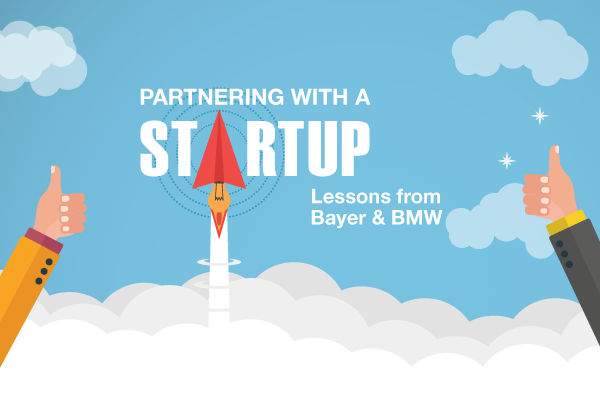Lessons from Bayer & BMW on Partnering with Startups

By Associate Professor of International Business and Strategy Shameen Prashantham
For over a decade I have been researching new ventures partnering with large corporations – what I refer to as "dancing with gorillas". Most of this work has focused on startups in the information technology space, and most of the "gorillas" that I found these startups actively engaging with were the likes of Microsoft, IBM and Google. More recently, however, it has become evident that a much wider range of large corporations, many from traditional sectors such as the automotive, financial and pharmaceutical industries, are actively reaching out to startups with digital and related expertise. And some of them have developed sophisticated partnering interfaces to do so, as I discovered on a recent research visit to Germany.
A case in point is Bayer. In 2013, Bayer made a concerted effort to enter the digital health startup engagement space through its Grants4Apps (G4A) program, which drew the inspiration for its name from an earlier grants program, Grants4Targets, introduced by Bayer to support medical innovation, largely in universities. The initial activity was the provision of €5,000 grants for software solutions to healthcare topics in Germany. In 2014, Bayer added a 100-days accelerator format, providing €50,000 financial support and deep mentoring to selected digital health startups from across Europe. Notably, the startups were provided office space inside Bayer's premises in Berlin, partly to expose Bayer's employees to the entrepreneurs' novel ideas and fresh energy. In 2015, the accelerator program was repeated, this time with two variations: it was open (1) to startups from anywhere in the world and (2) to internal Bayer employees with startup ideas. One of the five selected startups was from Shanghai, co-founded by a Malaysian Bayer employee in that office along with her German husband – a truly international startup! In 2016, its third cohort ran from late August-early December 2016 and included four startups: one each from Germany, Ghana, Hungary and South Korea. In this latest edition, a more concerted effort was made to link the expertise of the startups with Bayer's areas of interest. For instance, the Hungarian startup, Turbine, has been working with Bayer's bioinformatics team on projects involving the digitization of cells and molecules in order to examine their interactions virtually.
Another interesting example is BMW's Startup Garage program, which seeks to implement a new model of engagement which it terms the "venture client" model. Basically, the Startup Garage offers the startup to gain BMW as an early client. BMW Startup Garage reaches out to startups through multiple touchpoints, and reviews the information it receives from startups through a stage-gate process: screening for quality as a startup, strategic fit with BMW and potential to become a market leader are key selection milestones. After this rigorous selection process the Startup Garage team's biggest value add for startups lies in identifying a specific, real innovation project for the startup to work on in conjunction with a BMW business unit. These projects are directly related to car technologies or to improving relevant processes. BMW is clear that the startup is the owner of the intellectual property (IP) and acts in the capacity of a supplier (and receives a supplier number when a project is initiated.) While achieving the two-sided matching that is required to come up with a viable project of mutual interest takes considerable effort, this process is aided by the presence of an innovation manager in each of BMW's divisions. Although BMW does not publish the numbers or identities of the startups, discussions with industry experts suggests that the Startup Garage's client vendor model stands out as a new model for startup engagement.
Corporations in traditional sectors seeking to work meaningfully with startups can take inspiration and insight from Bayer and BMW. However, it should also be recognized that these corporations' achievements involved a tremendous effort. Three lessons, in particular, are worth noting. First, it is important for managers to demonstrate entrepreneurial behaviors in order to develop innovative startup programs as large organizations are typically bureaucratic and not geared towards the creative and nimble activities that are required for winning the hearts and minds of startups. Second, there needs to be a continuous learning process as the partner interface is developed and refined over time. Even in the case of infotech giants such as Microsoft that have cultivated large partner ecosystems, the startup engagement journey has been a long and non-linear one entailing trial-and-error learning; this is likely to be even more the case for corporations in traditional sectors with much less startup partnering experience. Third, startup engagement must be aligned with the corporation's overall innovation strategy. For both Bayer and BMW, there was active support from the top because of the explicit alignment with the corporation's goals, particularly in relation to innovation. Without such support, startup engagement is less likely to succeed.
This article was first published by The Economist Intelligence Unit.
WATCH: Prof. Prashantham interviews the Head of BMW Startup Garage Gregor Gimmy in Munich. (VPN required in China)









